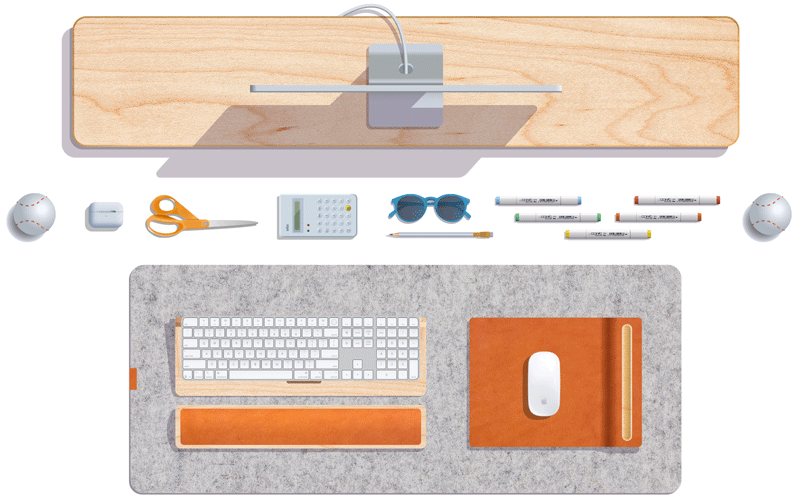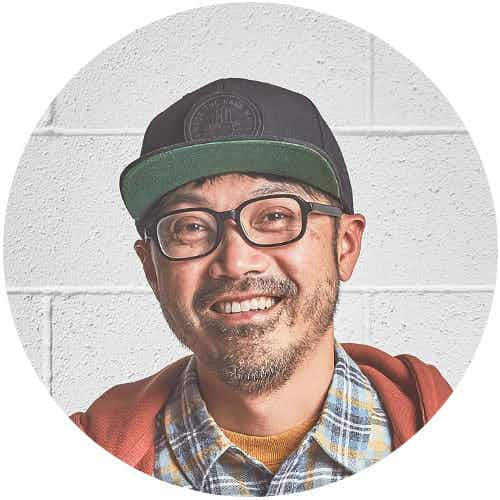The Studio Pad took us on quite a design journey, from debates about container design theory to the challenges of creating a minimal stand that's over three feet long. Come behind the scenes and get to know the latest addition to our workspace lineup a little better.
Setting the Stage
The process started in 2015, when we designed our wool desk pad. The idea was to do several things at your desk: protect the surface, define the space like an area rug, and slide around, so that you could use it to organize and move your space depending on your work. It was all about the material, and we landed on 100% Merino wool felt, a classic material that's included in many of our products.
Then in 2018 we kicked off a redesign of our classic mouse pad. The mouse pad was designed in 2014 as part of our first desk collection, and we wanted to modernize and improve the design manufacturability.
Then in 2018 we kicked off a redesign of our classic mouse pad. The mouse pad was designed in 2014 as part of our first desk collection, and we wanted to modernize and improve the design manufacturability.

SEAN KELLY (Lead Designer): Because we design and manufacture so much, you learn and have a natural give and take between product design and manufacturability. The original mouse pad design started presenting hurdles, so we used it as an opportunity to try something new with a full-width aluminum base.
The new mouse pad was a hit, and we loved the process and result. It got us thinking— could we do something similar in a larger size? Could we use the same combinations of materials and bends? The mental seeds were set.

The layered design update to our mouse pad.
Consider the River

When we designed the Note Taking Kit in 2021, it unlocked something in that space. The main use was note taking, but we found a secret menu of sorts for the Display Rail: we started putting things we found, pictures, or stickers—things that caught our attention and inspired us—into the display rail, not just notes.

The magical uses beyond note-taking got us dreaming of something bigger. So we started work, inspired by the rigid aluminum base on the mouse pad, the delightful uses we found with the display rail, and this idea of finding the perfect flow in the river. A major challenge, however, was making a product with rich, flexible functions that retained minimalism.
A Stand That Doesn't Look Like It
We always design stands so they look considered with or without any tech on them. With the Studio Pad, it was a considerable challenge, because rather than just one tech item, it needs to handle a wide range of different items (iPad, iPhone, notecards, wallet). And it needs to display and store flexibly, because many of the items are used for a brief period.

KEN TOMITA (Grovemade Co-Founder): With the Studio Pad, the challenge of a subtle stand design was harder to achieve, because it's designed for many different things, and things that come and go regularly. It has to be very minimal in the lines and materials because the literal footprint is so big. It's a delicate balance.
We had to design a stand that offered real functions, had a large footprint, and could flexibly hold many different items for different amounts of time. It meant we really had to get into the details to make sure it all balanced in the end.
Materials and Bends
The two direct products we mentioned—the display rail and the mouse pad—use bent metal and lamination to create function. The display rail uses soft angles and curves to create the ideal viewing height for things placed there. The mouse pad aluminum sweeps up to reveal the added thickness of the pen tray.
However, the angles in the metal communicate that it should be a stand—meaning it looks more 'stand-like' when nothing is on it. For the Studio Pad, we wanted to disguise that it was a stand. We modeled various bends, and in the end we opted for a 90° bend—very unusual for a stand.
However, the angles in the metal communicate that it should be a stand—meaning it looks more 'stand-like' when nothing is on it. For the Studio Pad, we wanted to disguise that it was a stand. We modeled various bends, and in the end we opted for a 90° bend—very unusual for a stand.






